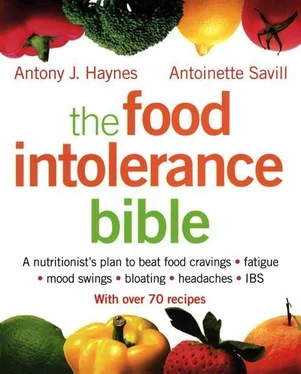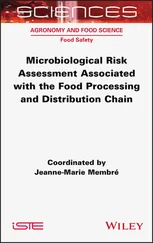So, can you prove that food intolerance is really the cause of your symptoms? In many cases, you may not need any more proof other than the fact that when you avoid a food you do not get a symptom, but when you eat it you do. In other cases you may have a suspicion about a certain food and therefore an approach which involves elimination/reintroduction – removing the suspected food from your diet and later on reintroducing it into your diet – may serve a useful purpose. (This is not a good thing to do if you have a true food allergy, however). Alternatively, you may wish to implement the pulse-testing method, which will be described later.
However, there are some people who have a potential for multiple food intolerances, which makes an elimination diet and reintroduction difficult to implement. In these cases, a test to tell you which foods you react to would be very useful.
Most people in this situation want to have a firm diagnosis of what is causing, or contributing to, their problems. Equally, practitioners also want to have some certainty about what is wrong with their patients so they can make the most apt recommendations. To this end, a degree of proof is always useful – and in Chapter 2you will find descriptions of a number of accurate tests to help you gather this proof. However, simply testing for immune reactions does not prove in itself that this is the cause of your symptoms; there can be a number of foods to which you are intolerant that cause you no symptoms at all. This is where the avoidance of these foods and a monitoring of symptoms can ‘prove’ the point nicely. The reintroduction of the offending foods should trigger, in a way that can be easily reproduced, your symptoms.
There have not been many large studies conducted to ‘prove’ how food intolerance affects various aspects of health. However, there have been studies that show very strong evidence of cause and effect between food intolerance and Irritable Bowel Syndrome (IBS). Indeed, one complaint a medical doctor friend of mine raised about this issue was that he wasn’t particularly aware of any ‘decent’ studies showing that food intolerances really were to blame for a number of symptoms they are claimed to cause. One of the very good reasons for this is that typical medical studies (randomized, placebo-controlled, double-blind studies) are designed to test a drug against a sign or symptom. They are not designed to evaluate the effects of a number of different agents (i.e. foods) on multiple variables (i.e. symptoms). Furthermore, in the case of food intolerance, since the technology for testing is relatively new and because there is no one single test that will accurately identify every single food to which an individual may react, there is difficulty in verifying exactly what foods should be assessed.
IBS was the subject of a recently published study in the respected journal Gut, which showed that food intolerances are very much involved in Irritable Bowel Syndrome (IBS). It proved what most complementary practitioners have known all their professional lives.
The study involved 150 out-patients with IBS who then had an IgG food intolerance test. They were not shown their results. Seventy-five of the participants were provided with diets that excluded the foods to which they had raised IgG antibodies, while the other 75 participants were given ‘sham’ diets that excluded foods to which they did not have raised IgG levels. A number of symptoms of IBS were compared before and after the diet for 12 weeks. The conclusion was that a diet that eliminates foods to which you have a raised IgG level is indeed effective in reducing the symptoms of IBS.
You may say that this is an obvious finding and you might have expected as much, but the current treatment of IBS is based largely on the use of antispasmodics, antidepressants and medications that alter bowel habit, depending on whether constipation or diarrhoea is the predominant problem. This is usually unsatisfactory, however, and encourages patients to seek out alternative treatment. Of course, if food intolerance is to blame for the symptoms, even if not wholly, then the most sensible first-line approach would be to change your diet. This would make recourse to medications the alternative path.
This study represents an important landmark in acknowledging the importance of food in triggering or causing IBS. The patients had experienced symptoms for over a decade and were found to be sensitive to approximately six to seven foods each, on average. Those who fully adhered to the diet showed the greatest improvement.
The reintroduction of the culprit foods also caused their symptoms to get worse. The patients did not embark on anything other than eliminating the culprit foods: They did not take any digestive enzymes, nor anything to restore low stomach-acid levels. They did not supplement with ‘friendly’ bacteria to combat any possible yeast overgrowth. They did not take active steps to heal their intestinal lining, nor did they take active steps to reduce their stress levels. If these things had been addressed, it is likely that their improvements would have been even greater.
Food Intolerances and Emotional/Behavioural Issues
While it is much more straightforward to understand a link between what you put in your mouth and what happens to your digestion, it is less obvious to see the relationship between what you eat and how you feel in your head, or how you behave. However, as you will see later in this book, there are many food-intolerance symptoms that do not affect digestion.
Your digestive system is designed to absorb tiny components from food to nourish your body. However, it is not always 100 per cent successful at preventing the absorption of some matter that can be harmful to or upset the functioning of various organs elsewhere in the body (including the brain). This has long been the subject of published studies, and the basis for clinical treatment. As long ago as 1916, a Dr Hoobler reported that infants can be intolerant to proteins. Since that time, other studies have identified that reactions to foods can cause hyperactivity, nervousness, learning problems, minimal brain dysfunction, depression, hostility, aggression, periods of confusion and irritability. In those days the distinction between allergy and intolerance had yet to be made, so researchers simply used the word ‘allergy’ to cover all symptoms and consequences.
If you ever doubted that your irritability, mood swings, clumsiness or brain fog could be the direct result of a food intolerance, then you will swiftly strengthen your resolve when you hear the following accounts.
The first case to share with you is that of one of my clients, who came to see me with a whole list of complaints. Sally Ann had energy problems, mood problems, digestive problems, skin problems and more. As part of our consultation she completed some questionnaires. One of these, called the Metabolic Screening Questionnaire, is scored on a severity and frequency basis so that the more severe and frequent the symptoms, the higher the score. The maximum score for the 70 symptoms on the questionnaire is 280 – but anything over 80 is indicative of someone with fairly compromised health. A healthy individual may score as little as 10 or less. Sally Ann scored 97. Her doctor was considering antidepressants and hormonal intervention to help her mood, irregular menstrual cycle and painful periods. A thorough examination of her health history and diet and lifestyle revealed that there were many potential areas that could have been contributing to Sally’s overall poor state of health. Her diet was particularly high in wheat, which was being consumed at each meal. This was partly due to a lack of time to choose anything different, but none the less Sally was fulfilling the number-one criteria for food intolerance: a high dose and repetitive intake of the same food. When questioned, it was not clear-cut that her increased wheat intake had coincided with her multiple symptoms. However, since the priority was to improve digestive function, I recommended a wheat-free diet.
Читать дальше












